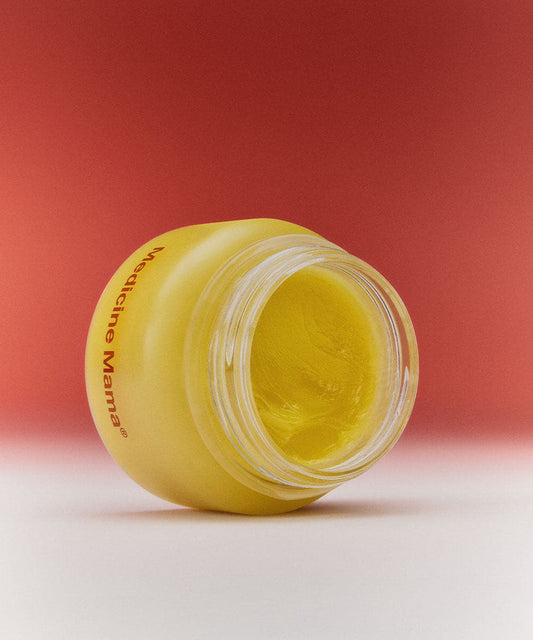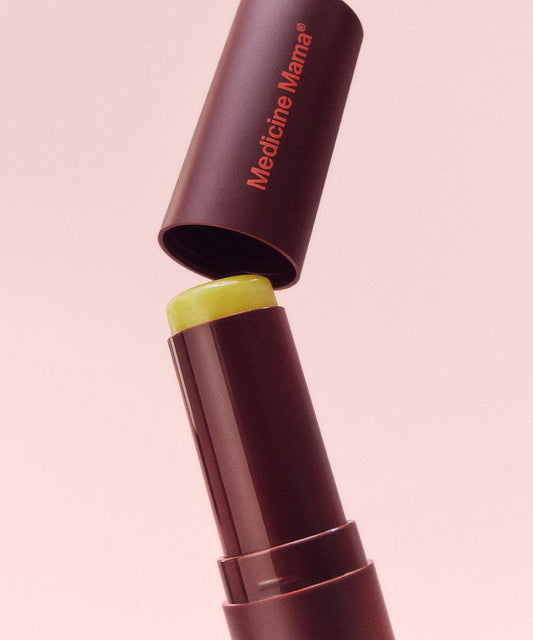
Reviewed by | Melinda Hany
At Medicine Mama, we know estrogen isn’t something most people think about until it starts pulling a disappearing act. One minute, your body is handling business without a second thought. The next? You’re sweating through your sheets, snapping at your partner, or standing in the kitchen with no clue why you walked in.
If that sounds familiar, you’re not alone. A dip in estrogen can mess with your whole groove, and it’s not always subtle. The good news? There are ways to manage the shift, support your body, and feel more like yourself again.
What Does Estrogen Actually Do?
Short answer? A lot more than it gets credit for. Estrogen is a hormone your body makes mostly in the ovaries, and it’s involved in way more than just your reproductive system.
It helps keep vaginal and vulvar tissue soft, stretchy, and moisturized. It supports natural lubrication, which makes sex feel good and not like sandpaper. It also helps regulate mood, sleep patterns, memory, and even your ability to focus during a conversation without spacing out halfway through.
Beyond that, it plays a role in bone density, cholesterol balance, fat storage, skin texture, and body temperature. If you’ve ever felt suddenly flushed or like your internal thermostat’s broken, shifting estrogen levels could be part of the reason.
Basically, it supports how your body feels, functions, and responds physically, mentally, and emotionally. So, when it starts to drop, it makes sense that a lot can start to feel off.
What Causes Estrogen Levels To Drop?
There’s no one-size-fits-all timeline for when estrogen starts dipping. For some, it’s gradual. For others, it feels like flipping a switch.
Either way, here are the most common culprits behind the shift:
Postpartum and Breastfeeding
After you give birth, your estrogen levels can take a serious nosedive. This is partly because your body is shifting focus to other hormones, like prolactin, which helps with milk production. If you’re breastfeeding, your estrogen can stay low for months, which can lead to all kinds of side effects — it’s one of those things nobody really warns you about, but it’s completely normal.
Perimenopause and Menopause
This is the big one. Perimenopause is the years-long lead-up to menopause, and it’s when your estrogen levels start to become less predictable.
They’ll spike, plummet, and generally act like a teenager in a mood swing, which can leave you feeling a little off. Once you hit menopause — the official 12 months without a period — your estrogen settles into a new, lower baseline. This is when a lot of the classic symptoms really set in.
Stress
Stress isn’t just a mental thing — it has a very real impact on your hormones. High levels of stress can mess with the delicate balance of estrogen and other hormones, pushing your body into survival mode and putting long-term hormone production on the back burner.
It’s like your body’s saying, “We don’t have time for this right now.” Over time, this can lead to a noticeable dip in estrogen.
Medications and Surgeries
Certain medications, like hormone blockers, some birth control pills, and cancer treatments, can seriously mess with your estrogen levels. Surgeries like a hysterectomy (removal of the uterus) or oophorectomy (removal of the ovaries) can also cause a sudden drop, especially if your ovaries are taken out. This can lead to a fast-track version of menopause, complete with symptoms.
What Are the Symptoms of Low Estrogen?
You now know what estrogen does and the common reasons it dips, but what do the symptoms actually look like? Although everyone’s experience is a little different, there are some telltale signs that your body’s working with less estrogen than it used to.
1. Vaginal Dryness and Discomfort
You might notice things feel different — less stretchy, more sensitive, or just dry in a way that’s hard to ignore. For some, it shows up during sex. For others, it’s an all-day thing: leggings feel annoying, sitting too long gets uncomfortable, and you’re constantly adjusting in your seat.
This is one of the most common signs that estrogen is dipping, and it’s nothing to be embarrassed about. Daily moisturizers made specifically for the vulva can go a long way here.
Our VMAGIC® Vulva Balm is a gentle, hormone-free option made to hydrate and support skin that’s feeling tight, irritated, or just off. A little goes a long way and consistency really does make a difference.
2. Low Libido
You're not in the mood and not even in the mood to be in the mood. Sound familiar? Lower estrogen can impact arousal and desire in ways that feel subtle at first, and then not-so-subtle. You might find yourself needing more time to feel turned on, more connection, or more physical buildup than you used to. That’s normal.
So, what helps? Rethinking what intimacy looks like is a good place to start. More foreplay. More touch. Less pressure to “perform.” “Patience is key,” notes Melinda Hany, Registered Nurse.
Try slowing down and seeing what actually feels good right now, not what used to. Masturbation is also helpful for reconnecting with your body on your own terms. The more you explore what works, the easier it is to feel ready when the moment comes.
3. Pain or Sensitivity During Sex
If intimacy’s starting to feel more tense than enjoyable, that’s your body asking for a little extra support. When estrogen dips, the tissue around the vaginal opening can get thinner and less cushioned, so penetration might feel scratchy, sore, or like your body’s quietly putting on the brakes. That’s not something to just push through or ignore.
A good water-based lubricant can make a major difference here. Our Intimate Glide is made with organic aloe and designed to supplement your body’s natural lubrication without harsh additives.
It’s been clinically tested and is hypoallergenic, which is especially helpful if your skin’s been a little more reactive lately. Start small, use it generously, and let comfort be the priority — not just penetration.
4. Sleep Disruptions
Falling asleep used to just happen. Now your mind won’t settle, you’re tossing around like it’s a sport, and even when you do manage to drift off, it doesn’t feel all that restful.
That mental clutter? The sudden 11 p.m. energy burst? The 4 a.m. “why am I awake?” moment? Yep — low estrogen can play a role in how your brain winds down (or doesn’t).
To keep sleep in check, try keeping a consistent bedtime, dimming the lights earlier in the evening, cutting back on caffeine, and avoiding screens at least an hour before bed. Light movement during the day (even a quick walk) can also make a difference. And if you're wide awake in bed, get up for a few minutes — sometimes just resetting helps your brain shift gears.
5. Mood Swings and Irritability
You were fine five minutes ago, and now you’re ready to cry because someone loaded the dishwasher wrong. When estrogen starts dropping, emotional regulation can get shaky fast. Small things suddenly feel huge. You might feel edgy, quick to snap, or just overwhelmed in a way that’s hard to explain.
You’re not overreacting. You’re adjusting. Journaling, therapy, movement, or just getting some alone time can help take the edge off, but the first step is recognizing that your mood shifts have a root. You’re not “just being moody.” Your body’s doing real work behind the scenes.
6. Hot Flashes and Night Sweats
Suddenly sweaty? Out of nowhere? Welcome to one of the more iconic low-estrogen symptoms. Hot flashes can hit randomly, last anywhere from seconds to minutes, and leave you feeling overheated and annoyed. Night sweats are basically the same, just sneakier and timed to ruin your sleep.
Layers help. So does breathable fabric. You can’t always stop them, but you can work around them. And no, you’re not just “running warm.” This is hormonal and a lot more common than most people talk about.
7. Trouble Focusing or Forgetfulness
Where did you put your phone? What were you about to say? Why are you staring at the fridge with zero recollection of why you opened it? If brain fog is creeping into your day, estrogen could be part of the picture.
Concentration and memory can take a hit when hormones fluctuate. You’re not losing your mind — you’re recalibrating. Sticky notes, calendar reminders, and voice memos are your new best friends. Be patient with yourself. You’re still sharp; your brain’s just a little fogged up right now.
A Final Word
Low estrogen can sneak up on you and shake things up in ways you didn’t see coming. From dryness to mood shifts to brain fog that won’t quit, it’s a lot, and you don’t have to navigate it solo.
If something feels off and isn’t getting better with simple changes, check in with your OB-GYN. A quick conversation can go a long way toward getting answers (and some actual relief).
At Medicine Mama, we make vulva care that’s designed for moments like these. Our essentials are clean, hormone-free, and made to support real bodies through real changes — no mystery ingredients, no outdated advice.
Explore our vulva-safe lineup and find what works for you now. You deserve to feel good in your skin again.
Sources:
Estrogen: Hormone, Function, Levels & Imbalances | Cleveland Clinic
Perimenopause 101: Age, Causes and How to Manage Symptoms | UnityPoint Health
Estrogen, Stress, and Depression: Cognitive and Biological Interactions | PMC
Vaginal Atrophy: Causes, Symptoms, Diagnosis & Treatment | Cleveland Clinic



